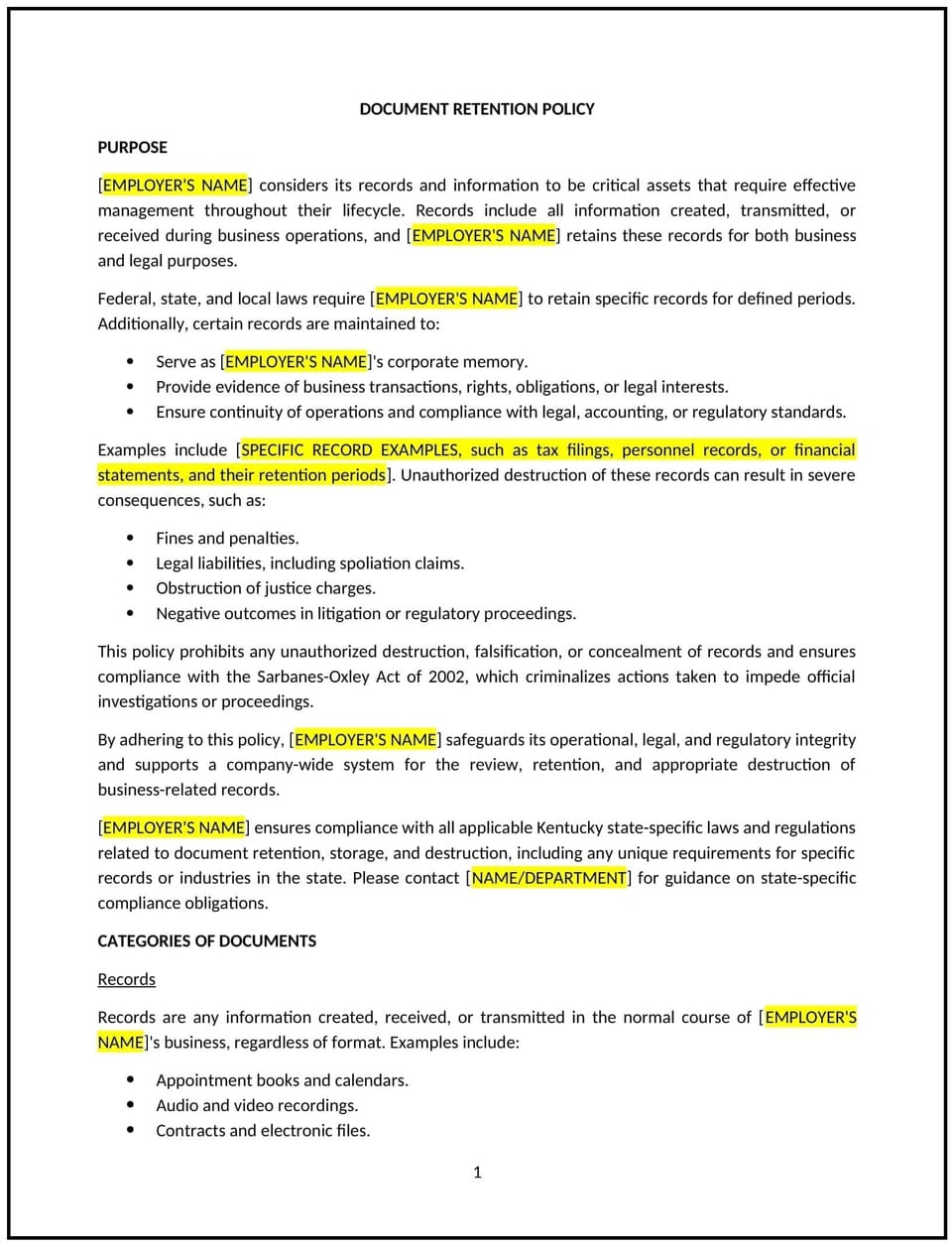Document retention policy (Kentucky): Free template

Document retention policy (Kentucky)
A document retention policy provides Kentucky businesses with guidelines for managing the storage, retrieval, and disposal of business records. This policy defines retention periods, outlines employee responsibilities, and ensures proper handling of documents to support operational efficiency, legal compliance, and data security.
By adopting this policy, businesses can reduce risks, improve organization, and maintain compliance with record-keeping requirements.
How to use this document retention policy (Kentucky)
- Define document types: Clearly categorize the types of documents covered by the policy, such as financial records, contracts, employee files, and legal documents.
- Establish retention periods: Specify how long each type of document must be retained based on legal, regulatory, or business needs.
- Outline storage requirements: Provide guidelines for secure physical and digital storage, ensuring records are easily accessible but protected from unauthorized access.
- Detail disposal procedures: Explain how documents should be securely destroyed or deleted after their retention period expires to prevent data breaches or misuse.
- Address compliance monitoring: Include procedures for auditing retention practices to ensure the policy is followed consistently.
- Specify employee responsibilities: Assign roles for managing document retention, including who is responsible for storing, accessing, and disposing of records.
- Include exceptions: Clarify any scenarios where documents must be retained beyond their usual period, such as for ongoing litigation or audits.
Benefits of using this document retention policy (Kentucky)
This policy offers several advantages for Kentucky businesses:
- Improves organization: Establishes a systematic approach to managing records, making it easier to locate important documents.
- Reduces legal risks: Helps businesses meet Kentucky’s record-keeping requirements and avoid penalties or disputes.
- Enhances security: Minimizes the risk of data breaches by providing guidelines for secure storage and disposal.
- Supports compliance: Aligns with industry standards and regulatory requirements for document management.
- Promotes efficiency: Streamlines document handling processes, saving time and resources.
Tips for using this document retention policy (Kentucky)
- Communicate the policy: Share the policy with employees and ensure they understand their roles in document retention and disposal.
- Use digital tools: Implement document management software to automate retention schedules and secure digital records.
- Train employees: Provide training on proper record-keeping practices, secure storage methods, and disposal procedures.
- Monitor compliance: Conduct regular audits to ensure retention practices align with the policy and address any inconsistencies.
- Review periodically: Update the policy to reflect changes in Kentucky laws, business practices, or technology advancements.
Q: What is the purpose of a document retention policy?
A: The policy provides guidelines for managing, storing, and disposing of business records to improve organization and reduce risks.
Q: What types of documents are covered under this policy?
A: The policy applies to various records, including financial documents, contracts, employee files, legal records, and operational data.
Q: How long should documents be retained?
A: Retention periods vary depending on the document type and legal or regulatory requirements, as specified in the policy.
Q: How are documents stored securely?
A: Documents should be stored in secure physical locations or password-protected digital systems to prevent unauthorized access.
Q: What happens when a document’s retention period expires?
A: Documents should be securely destroyed or deleted following the disposal procedures outlined in the policy.
Q: Who is responsible for managing document retention?
A: Specific roles, such as department heads or designated records managers, are responsible for overseeing document retention and disposal.
Q: Are there exceptions to the retention schedule?
A: Exceptions may apply if documents are needed for ongoing litigation, audits, or other special circumstances.
Q: How often should the document retention policy be reviewed?
A: The policy should be reviewed annually or as needed to ensure it aligns with Kentucky laws and organizational requirements.
This article contains general legal information and does not contain legal advice. Cobrief is not a law firm or a substitute for an attorney or law firm. The law is complex and changes often. For legal advice, please ask a lawyer.


